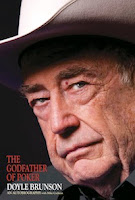Daniel Damns, Doyle Defends
 One of the topics Jeff “PKRGSSP” Walsh and I discussed briefly on his podcast Tuesday night was the recent spate of commentary from top pros regarding Full Tilt Poker, specifically Daniel Negreanu’s video blog from last week (which I wrote briefly about here) and Doyle Brunson’s response-slash-commentary posted on his blog on Monday (see the 2/20/12 entry). Since then Negreanu has posted another video blog in which he talks further about FTP as well as Brunson’s post.
One of the topics Jeff “PKRGSSP” Walsh and I discussed briefly on his podcast Tuesday night was the recent spate of commentary from top pros regarding Full Tilt Poker, specifically Daniel Negreanu’s video blog from last week (which I wrote briefly about here) and Doyle Brunson’s response-slash-commentary posted on his blog on Monday (see the 2/20/12 entry). Since then Negreanu has posted another video blog in which he talks further about FTP as well as Brunson’s post.I’m not going to summarize all of the back-and-forthing going on, nor am I going to rehearse the short conversation PKRGSSP and I had about it. But I did want to chime in with a few thoughts both about Brunson’s post and Negreanu’s rejoinder.
If you’ve read Brunson’s post you saw him acknowledging those who ran FTP to be guilty of “gross negligence and terrible mismanagement,” though ultimately defending Howard Lederer and Chris Ferguson against the charge that they knowingly committed fraudulent actions. Instead Brunson -- who interestingly includes scans of the handwritten pages from which his posts are transcribed (a latter-day testament to the authority of the written word?) -- mostly blames CEO Ray Bitar for all that has happened. Brunson refers to Bitar as “an unknown person to the poker world,” kind of like an outsider who wandered into an Old West town and was given an unreasonable amount of authority regarding those who call it home.
There’s a lot of imprecision in Brunson’s post regarding the facts of the case. “Exactly how FT lost their cash is not clear to me,” he says. “Something about processors, electronic checks they couldn’t cash, etc.” This despite earlier professing some inside knowledge thanks his close relationship with Jack Binion who for a time was considering buying the beleaguered site.
These hand-waving, vague allusions to the “something” that happened at Full Tilt Poker don’t do much to bolster Brunson’s credibility on the matter, but they do fall in line with his general defense of Lederer and Ferguson as being out of their element as businessmen. “The bottom line was they were poker players, not corporate executives,” says Brunson, suggesting that as such they might be forgiven for transgressions occurring under their watch.
 I can’t help but recall the succession of stories Brunson tells regarding his own failed business ventures in The Godfather of Poker, a few of which saw him and the late David “Chip” Reese losing money time and again on what Brunson calls “crazy schemes.” In other words, while his defense of Lederer and Ferguson partly stems from his friendships with the two (especially Lederer), I think it also comes from the fact that Brunson has been in a similar situation many times -- that is, being a poker player who found himself in over his head when trying to prevent a business venture from failing.
I can’t help but recall the succession of stories Brunson tells regarding his own failed business ventures in The Godfather of Poker, a few of which saw him and the late David “Chip” Reese losing money time and again on what Brunson calls “crazy schemes.” In other words, while his defense of Lederer and Ferguson partly stems from his friendships with the two (especially Lederer), I think it also comes from the fact that Brunson has been in a similar situation many times -- that is, being a poker player who found himself in over his head when trying to prevent a business venture from failing.Of course, none of those “crazy schemes” Brunson describes in his book appear to have hurt others like the one Full Tilt Poker did. Significantly.
In his video response to Brunson’s post, Negreanu draws an interesting parallel between Brunson’s defense of Lederer/Ferguson and Barry Greenstein’s statements about Russ Hamilton during the early days of the UltimateBet scandal back in the summer of 2008. In that case, Hamilton had already apparently been advised by lawyers not to speak (or so he said), but had a two-hour meeting with Greenstein which the latter then reported in summary fashion on the old PokerRoad podcast.
I don’t believe Greenstein went as far as to say he thought Hamilton was innocent. Nor do I recall any suggestion that the now-disgraced 1994 WSOP Main Event champion looked Greenstein “dead in the eye” and said he wasn’t aware of the cheating or any other wrongdoing (as Lederer apparently did with Brunson when asked “about the financial problems”). But Greenstein did say he wanted to believe Hamilton, and also in an indirect way indicated he thought Hamilton perhaps wasn’t as guilty as some believed by saying he thought Hamilton knew the guilty party or parties. (See here for more on that Greenstein-Hamilton meeting.)
I think it is safe to say now that Greenstein was somewhat off-the-mark in his assessment of Hamilton. And while the parallel isn’t perfect I think Negreanu’s reference to it makes some sense in this context, especially given how Brunson’s defense similarly evokes the relative knowledge of the accused.
 Negreanu also correctly brings up how the site continued to accept deposits from non-U.S. players after Black Friday (up until the end of June when the Alderney Gambling Control Commission suspended their license to operate). In the Department of Justice’s September 2011 amendment to the civil complaint, we see how Lederer was reporting “to others at Full Tilt Poker that there was only approximately $6 million left, and therefore no realistic ability to repay its new depositors.” In other words, Negreanu appears correct to point out that Lederer certainly knew something “about the financial problems” post-Black Friday (and of course likely knew things weren’t hunky dory before April 15, too).
Negreanu also correctly brings up how the site continued to accept deposits from non-U.S. players after Black Friday (up until the end of June when the Alderney Gambling Control Commission suspended their license to operate). In the Department of Justice’s September 2011 amendment to the civil complaint, we see how Lederer was reporting “to others at Full Tilt Poker that there was only approximately $6 million left, and therefore no realistic ability to repay its new depositors.” In other words, Negreanu appears correct to point out that Lederer certainly knew something “about the financial problems” post-Black Friday (and of course likely knew things weren’t hunky dory before April 15, too).To this point I would add what the amended complaint also alleges, namely how Full Tilt Poker continued right through the summer -- even after the site went down -- to claim repeatedly to all who asked that their “funds were safe and secure.” This, too, should go into the category of the numerous ethical failures on the part of Lederer et al., namely, to have allowed such reassurances to have been made when they certainly were false.
Brunson has already indicated he intends to follow up his post with more on the matter, so the dialogue between him and Negreanu will no doubt continue. As I said on PKRGSSP’s show, I think it is generally a good thing that these two are letting us know their thoughts on the issue given the prominent standing of both in the poker community. Their opinions matter, and will influence how others among us think about the situation going forward.
Ultimately, though, we’re still just dealing with the court of public opinion here, where the only real consequence is going to be the affecting of attitudes. We can and should keep talking about all this. But as far as resolution or reparation goes, for that we remain reliant on others.
Labels: *the rumble, Barry Greenstein, Black Friday, Daniel Negreanu, Doyle Brunson, Full Tilt Poker, Russ Hamilton














0 Comments:
Post a Comment
<< Home